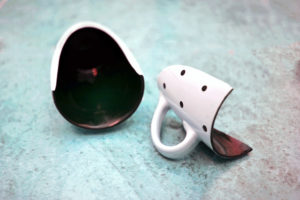My husband and my youngest daughter walked into church and sat next to me on the pew. In an instant, I knew something was up. Their stiff posture, sideways glances, and exasperated sighs said it all. They were annoyed with each other. Clearly, something had gone on between them and I was catching the fallout from it. I chose intentionally not to be annoyed at their perceived mutual annoyance. ???? I remained calm, looked them both in the eyes as I lovingly tapped their knees to acknowledge my pleasure in their presence, and then proceeded to peacefully enjoy the meeting.
When church finished, my daughter waited to ride home alone with me. As we walked, we chit-chatted about seeing our friends and what happened in our classes. But once in the privacy of the car she quickly unloaded. “Mom, on the way to church Dad kept asking me all these questions, and then he’s like, “Why are you so grumpy?” And I’m like, “I wasn’t grumpy till I got in the car with you.” Ugh, he’s just so annoying. Sooooo annoying. Can you please make him stop?”
Later that afternoon I asked my husband about it. He meant well. He was simply asking questions to talk to our daughter on the car ride to church. He believed he was being a ‘good dad’. Things only went sideways when he began to think her answers meant something they didn’t. He believed his perception was our daughter’s truth. He thought he knew what was going on for her.
This is projection at its finest.
“Why are you so grumpy?
This is projection at its finest.
He thought her one-word responses were a sign she didn’t like the questions he was asking. He thought she was replying in that way to avoid conversing with him. Knowing she usually talks, he then assumed she must be grumpy. He believed he knew what she was thinking and feeling. Because he believed he was reading her correctly, he said what he thought out loud without even questioning it.
The problem here is two-fold. He was wrong. And projection is deadly.
Her short answers were a symptom of her preoccupation and intense focus on her hair. Yep, her hair, NOT on him. She’d been rushed to get ready for church after sleeping over with cousins at her Grammy’s house. She didn’t have time to meet her “I-can’t-look-bad-in-public” teenage expectations. So, to remedy her hair issue, she was desperately focused on having me braid it at church. She couldn’t think about or process much else. Her hair is vital to her image and her image is vital to her. Her responses had everything to do with her hair and nothing to do with her dad. So when he made those assumptions and labeled her as “grumpy”, she lost it. It pushed her over the edge and she snapped. She wasn’t grumpy. She was drowning in a sea of insecurity and trying to avoid feeling embarrassed at church.
Projection is the process of displacing one’s thoughts or feelings onto another. In this situation, my husband was the one feeling grumpy. He was having a conversation that didn’t meet his expectations. He then displaced or projected his emotional state onto our daughter. He believed she must be grumpy too.
It’s natural to project. As humans, we’re amazingly perceptive of other humans. We can read each other. We can walk into a room and almost immediately know what’s going on. The vibe is evident. Almost as if it’s hanging in the air. It’s an amazing skill most humans are experts at. Because of this, we assume with conviction that our perception is accurate. As a reflexive and automatic habit, we displace our thoughts and feelings onto anyone in sight, including our teenagers. And we do it with the certainty that we KNOW they’re experiencing what we believe they are.My friend, even if you’re right, literally SPOT ON about what someone is experiencing, projection is deadly. It kills connection on contact. And it’s terribly difficult to recover from. No one wants to be told what they’re experiencing. Period.
In fact, the opposite is what’s true. Everyone wants to share what they’re experiencing. They want to talk about what they think and feel. They want to be heard and they want us to listen to them.
In parenting, projection goes a step further. All humans have a unique lens and perception with which they view the world. Parents tend to throw their projections onto their children and they ingest them. As they age, repeated projections often result in children failing to curate their own ways of thinking and feeling. They learn to trust their parents’ perception of their experience in life instead of trusting their own. Our children know what they feel. They know what they think. It’s our job to teach our children to trust themselves. To teach them to focus inward and locate the internal knowing that is creating their current experience.
Please hear me when I say there is nothing more repellant to teenagers than projection. Projection kills connection. It will obliterate your chances of creating a lasting, fun, and meaningful relationship with your teen. It will shut them down and build walls between you. And then you’ll need to tear down the walls BEFORE you can start connecting. If you want to make your life easier, remember – Projection is deadly. So just don’t do it. ????




